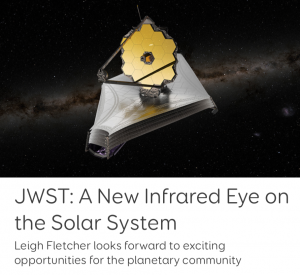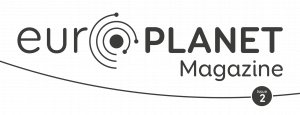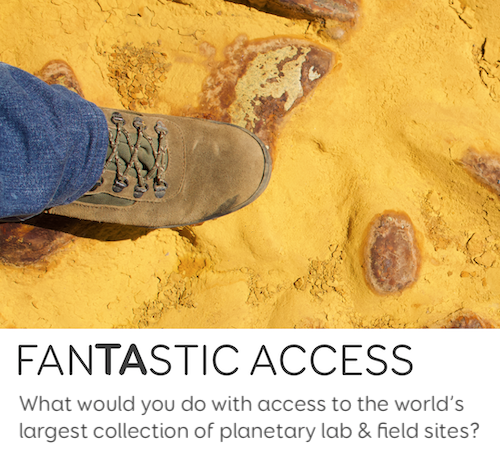Issue 3 of the Europlanet Magazine is out!
The official magazine of Europlanet, the European community for planetary science.
We are delighted to share with you the third issue of the Europlanet Magazine. The e-magazine is published twice a year and aims to highlight the range of activities by Europlanet, our partners, and the wider planetary community. If you would like a printed copy of this issue, or the two previous editions, you will be able to pick one up at the Europlanet Society stand at EPSC2022 in Granada.
The third issue highlights the exciting upcoming opportunities for Solar System and exoplanet science with the James Webb Space Telescope (JWST). Our ‘In Focus’ news section reports on recent workshops held through the Europlanet 2024 Research Infrastructure (RI), a monthly webinar series for members, a new podcast from the Europlanet Early Careers (EPEC) network and resources to support the LGBTQIA+ members of our community. We look at the experiences of participants in the Europlanet Expert Exchange and Mentorship programmes. We also have features on running data challenges, using AI to improve predictions of the impact of solar storms, and a schools outreach programme for meteor detection.
Please check out Issue 3 and share with your networks to help us spread the word.
In this issue:

A round up of news from Europlanet 2024 RI, the Europlanet Society, the Europlanet Early Careers (EPEC) network and the planetary community.
- Meet us in Granada at EPSC2022!
- Monthly Webinar Series for Society Members
- Europlanet Pro-Am Comet Community Workshop
- Fast Track Transnational Access
- Fire in the Sky
- Planetary Mapping Winter School
- Get Involved in EXPLORE
- Europlanet Telescope Network Science Workshop
- EPEC Annual Week 2022
- #PlanetaryScience4All EPEC-EPSC Video Contest 2022
- Stay Tuned for a Stairway to Space
- New Look for EPEC
- Europlanet Outreach Funding Scheme and Prize 2022
- Lighting Up the Skies of World Expo
- Pride in Planetary Sciences
- ESFRI Celebrates 20 Years
- Togo Under the Stars
MOMSTER, a Mobile Meteor Detection Station for Education and Outreach
Karolien Lefever, Stijn Calders and Hervé Lamy (BIRA-IASB) describe how schools are becoming involved in meteor research through the MOMSTER project.
Planetary Perspectives
Gražina Tautvaišienė, Director of the Institute of Theoretical Physics and Astronomy at Vilnius University (Lithuania), talks about her inspirations, the development of astronomy in Lithuania and sharing her passion for science with the next generation in this month’s Planetary Perspectives Q&A.
Support for Ukraine
We ask for the planetary community’s help to share information and identify support schemes for colleagues in Ukraine and displaced researchers
JWST: A New Infrared Eye on the Solar System

Leigh Fletcher, Professor of Planetary Science at the University of Leicester (UK), reveals how the James Webb Space Telescope (JWST) will provide exciting new opportunities for the exploration of our Solar System.
JWST: An Eye on Exoplanets
Brett Morris and Clémence Fontanive of the Universität Bern/National Centre of Competence in Research (NCCR) PlanetS (Switzerland) look at how the James Webb Space Telescope (JWST) is set to revolutionise exoplanet research.
Europlanet Mentorship Programme: Two Years After Launch
Edita Stonkutė of Vilnius University (Lithuania) and Jen DeWitt, Evaluation Officer for Europlanet 2024 RI (UK), examine how mentoring can support the planetary community.
Taking on the Data Challenge
Ingo Waldmann of UCL (UK) explains how launching a data challenge linked to the Ariel mission has led to new approaches and collaborations.
Exchanging Expertise
Maria Genzer of the Finnish Meteorological Institute (Finland) reports on how Europlanet’s Expert Exchange Programme is supporting skill-sharing within the planetary community.
Using AI to Predict the Danger of Solar Storms for Earth
Hannah Rüdisser of the Know-Center (Austria) and Ute Amerstorfer of the Space Research Institute (Austria) show how machine learning and artificial intelligence can help protect us from damage caused by solar storms.
Inspired by a Contest
Helen Usher of the Faulkes Telescope Project (UK) describes how a Europlanet arts contest has led to collaborations with a young Lithuanian astronomer, Rytis Babianskas.
An Interplanetary Journey in Design – Building the Europlanet Brand
Vix Southgate (Europlanet 2024 RI Communications Team) describes some of the creative steps (and missteps) in nearly two decades of the Europlanet brand.
Industry Insights
Marcell Tessenyi (BSSL Ltd) and Jeronimo Bernard-Salas (ACRI-ST) present results from a community survey on academic-industry collaboration.
In Memorium – Maria Teresa Capria and Károly Szegő
The first few months of 2022 has seen the passing of two of the key founder members of the Europlanet programme. Michel Blanc, Coordinator of Europlanet from 2005-2012, reflects on their contribution and legacy.
CommKit
The Europlanet Magazine’s column on science communication by Shorouk Elkobros (Europlanet Society/ESF) looks this month at videos for science communication.
The Last Word
Nigel Mason highlights a strategic opportunity for the planetary community.




